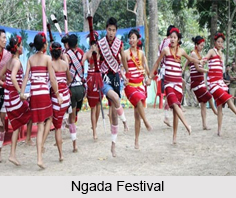 Ngada Festival of Rengma tribes is actually a “Thanks giving†festival of Nagaland. It is a post-harvest festival that celebrates a successful harvest. The people of the tribe come together and harmonize the smooth working of the festival. This festival is celebrated with pageantry of colour and music for 8 days, each day has its own significance of importance. Ngada is the symbol of the end of the agriculture year. It is a popular belief of the ancient Rengmas that the spirits of the dead visit their graves and the homes of their relatives once every year, particularly during this festival.
Ngada Festival of Rengma tribes is actually a “Thanks giving†festival of Nagaland. It is a post-harvest festival that celebrates a successful harvest. The people of the tribe come together and harmonize the smooth working of the festival. This festival is celebrated with pageantry of colour and music for 8 days, each day has its own significance of importance. Ngada is the symbol of the end of the agriculture year. It is a popular belief of the ancient Rengmas that the spirits of the dead visit their graves and the homes of their relatives once every year, particularly during this festival.
Celebration of Ngada Festival
The village priest notifies the commencement of this festival. He proclaims the auspicious day after estimate of the month by the movement of moon. While proclaiming the day he takes into consideration the fact that every householder must be in a position to bring crop in their house and stock in their proper granaries by ritual law. It is a taboo to bring home any grain after celebration of this festival.
•Ngada Festival starts with the preparation of all kinds of beverages.
•The second day is meant for cleaning houses and compounds. Grave yards and jungle are cleaned by the male.
•The third day is known as "Zu Kephe Dzon". All the house-wives go to the grave in the morning. Each member visits his friends or neighbours house to enjoy the festival by sharing food and drink.
•The fourth day is known as "Kenyhun Dzon". It is the day of cultural activities. Male folks dress up in traditional battle costumes and go around the village in procession. The women folks offer them with beverages, rice and meat. Each and every individual has to taste or sip the items if and when offered. Finally, they gather at Morung and narrate how one had encountered his enemy or foe and how he struggled and won his trophy.
•The fifth day is devoted to cultural activities like dancing, traditional games and sports. The players are awarded as per their ranks.
•"Rungsu Dzon" is celebrated on the sixth day where people visit each another`s home.
•The seventh day is marked by the preparations for the grand feast and collection of firewood, banana leaves and vegetables from the forest.
On the eighth day, there is a grand feast and few rituals are performed for better future.
The Ngada Festival ends with high hopes and great expectations that tomorrow will usher in a fruitful and prosperous agricultural new year, augur healthy climate and happiness to the villagers.



















